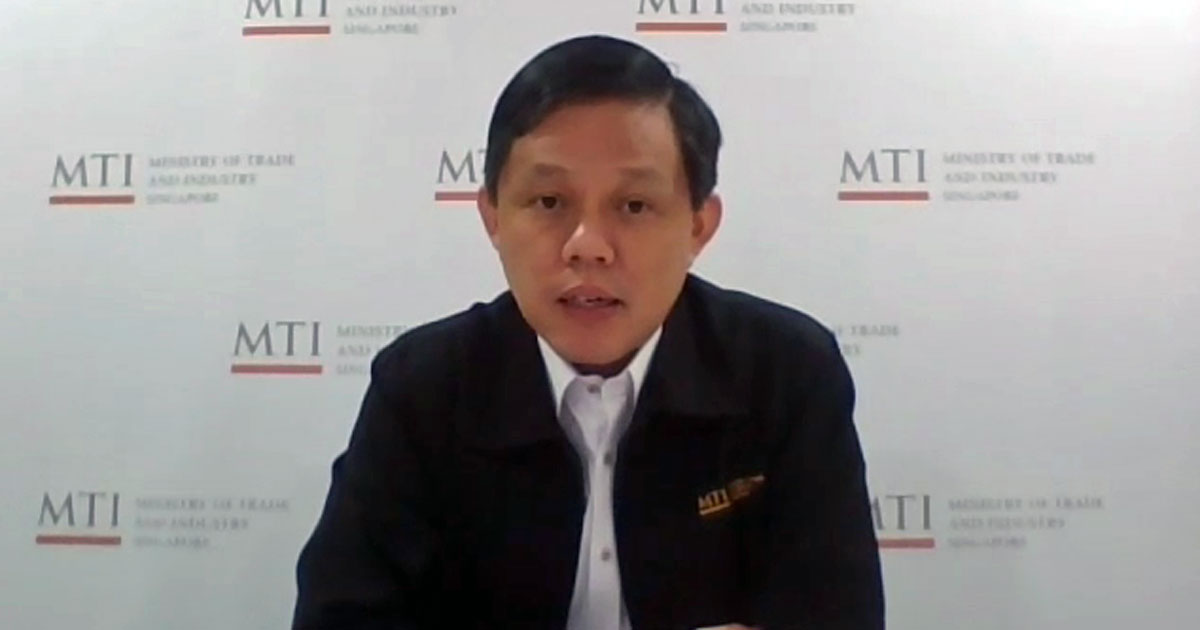It is not realistic for Singaporeans to replace foreign workers in the construction industry, as Singapore's labour pool is finite, Minister for Trade and Industry Chan Chun Sing during a virtual doorstop interview with local media on Saturday, May 30.
Chan said that while Singapore has been trying to reduce its reliance on foreign labour in certain industries, foreign workers will remain necessary in many sectors, due to Singapore's need to compete on the global stage, and the small native labour force here.
Reducing reliance on foreign labour would require a concerted effort
According to Chan, Singapore's foreign manpower demand ranges from low-wage construction workers to higher-wage skilled professionals that complement Singapore's workforce.
He said that Singapore's position has always been to see how the nation can reduce its dependence on lower wage workers, in industries such as the cleaning and construction.
For example, Singapore has been using information management systems in order to digitise processes, compressing the need for foreign manpower required in the construction, security and cleaning industries.
He also noted that this will require a "concerted effort", and that the need for foreign manpower in certain sectors, such as the cleaning industry, can be weaned further if Singaporeans change their habits.
"For example, if we have some of the social habits of the Japanese to clean up after themselves, and to take care of the environment, then we can also reduce some of these (foreign manpower needs)," said Chan.
Important to attract talented foreigners to Singapore
However, Chan also emphasised that it was important for Singapore to attract talented foreigners to bring businesses to Singapore, in order to create jobs for Singaporeans.
"We would like to have talented individuals to be part of Team Singapore, rather than competing against Singapore, if they were somewhere else," he said.
He brought up the example of a pyramid, where low-wage workers made up the bottom, while higher-wage professionals consisted of the top.
"What you want to do is to squeeze the bottom, to create more space for the middle and the top. And this is how we look at foreign manpower strategy holistically, rather than just one sector alone," Chan said.
Relying only on Singaporeans for certain industries is not realistic
Chan also said that Singapore with its low population is unable to replicate the efforts of other nations, who have been able to largely reduce their reliance on foreign workers.
He used the construction sector as an example, which currently employs approximately 300,000 foreign workers.
Chan made the assumption that a Singaporean would be three times more productive than a foreign worker, meaning that these 300,000 foreign workers would need to be replaced by 100,000 Singaporeans, who will be paid three times as much as the current construction workers.
This would amount to 2,500 new workers per cohort needed to fuel the construction industry, assuming that every Singaporean works for 40 years during their lifetime, said Chan.
With roughly 33,000 babies born per year, this would mean that approximately 8 per cent of each Singaporean cohort will need to be recruited into the construction industry, a scenario that may not be realistic, according to Chan.
"So do you think you'll be able to recruit, at every cohort of Singaporean babies, say about 6 to 8 per cent of them into the construction industry, and assuming that they will be three times more productive than the foreign worker?" asked Chan.
He said that although some Singaporeans may be willing to enter the construction industry, most prefer a diversity of jobs, which would make relying purely on Singaporeans for the construction industry an unrealistic scenario.
Larger nations may be able to shut themselves from the world
Chan said that foreign countries who assign a certain proportion of workers to the construction industry as part of their strategy to reduce foreign manpower dependence would inevitably end up with certain workers who are either more expensive, or less efficient at their jobs.
He said that it is important for Singapore to embark on projects swiftly, as Singapore competes on the global stage on the basis that "we are a good place for people to do business".
"So we need to understand that we have a finite labour pool. We have to ask ourselves, where do we put the over 30,000 babies per year? And unlike other countries, we cannot be thinking we will produce everything domestically, and because of the domestic demand, we will be able to circulate the cash flow around the economy. We do have to earn money and make a living with the rest of the world," said Chan.
He emphasised that unlike larger countries, Singapore cannot shut itself from the world, due to its low population.
Top image from MTI.
If you like what you read, follow us on Facebook, Instagram, Twitter and Telegram to get the latest updates.
